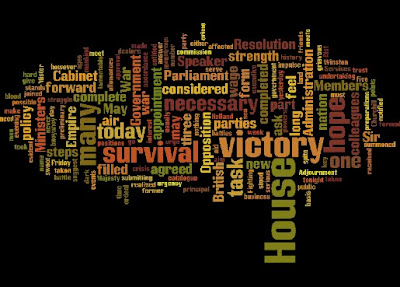 Another way to use word clouds is to analyze students' writing, checking for themes or even words that are being overused. Here is a word cloud generated from my master's capstone paper using the website Tagxedo (my personal favourite):
Another way to use word clouds is to analyze students' writing, checking for themes or even words that are being overused. Here is a word cloud generated from my master's capstone paper using the website Tagxedo (my personal favourite): Other uses for word clouds include comparing and contrasting writing (analyzing the difference between 2 different speeches), creating word walls, analyzing historical documents (ie: Canadian Charter of Human Rights), polling your class, or creating a gift (What words would you use to describe Mr. Cunningham?).
Other uses for word clouds include comparing and contrasting writing (analyzing the difference between 2 different speeches), creating word walls, analyzing historical documents (ie: Canadian Charter of Human Rights), polling your class, or creating a gift (What words would you use to describe Mr. Cunningham?).There are a number of different websites that allow you to create word clouds. Each one has slightly different features than the others, usually in terms of how you can customize the look of your word cloud. My best advice is to try them out for yourself. Here are a few of my favourites:
Wordle - the most famous and easy to use
Tagxedo - customize the shape of your word cloud
ABCya - easy to use
WordItOut - lots of options to customize
Tagul - click on any of the words to initiate a google search. Great for vocabulary.
TagCrowd - basic word cloud website
TagCloudGenerator - creates word clouds from web site URLs
If you are having trouble downloading or saving your word cloud, the video in this blog post will help you out.
Here is a word cloud of Hamlet's soliloquy from the website ABCya:

Thanks Andy. I like how you added classroom application examples to your blog post.
ReplyDeleteAnd this is the tip of the iceberg. There are so many uses for word clouds that I couldn't even think of.
ReplyDelete